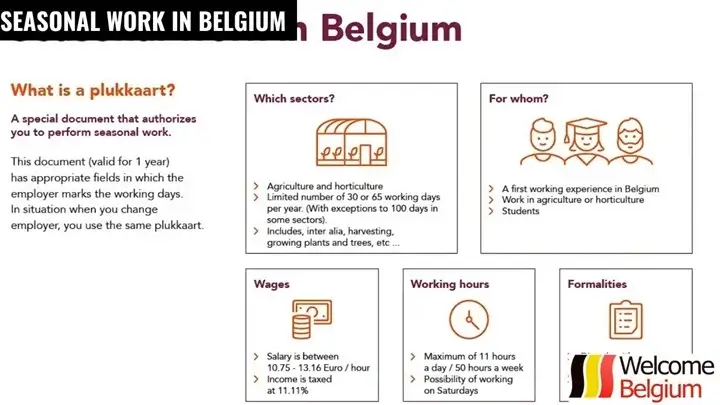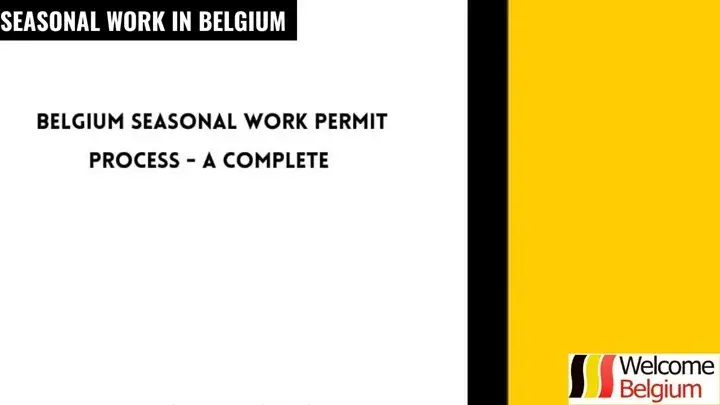Seasonal work in Belgium offers good opportunities for temporary earnings and getting to know a new culture. The main vacancies are concentrated in agriculture, tourism and logistics, where employees are needed to perform short-term tasks. Employers often offer competitive conditions, including help with housing. In this article, you will find tips on finding a job, preparing documents and avoiding risks.
Peculiarities of seasonal work
Seasonal work in Belgium can be a great option for temporary income, but for foreigners it can often be challenging. This primarily concerns paperwork, finding accommodation and adapting to local conditions. In addition, language barriers and differences in work culture can cause difficulties at the first stages of work. However, understanding the basic features and proper preparation will help you cope with these challenges.
Features of seasonal work in Belgium:
- Obtaining a work permit. Most seasonal positions require a work visa. This process can be complicated, especially for those seeking work abroad for the first time.
- Housing for seasonal workers. Some employers provide housing, but the cost is often deducted from wages. The alternative is to find it yourself, which can be expensive and time-consuming.
- Irregular work schedules: Agriculture and tourism often require long shifts, especially during peak seasons.
- Language barrier. Knowing one of the official languages of Belgium (French, Dutch or German) makes it much easier to find a job and communicate.
- Local norms and work culture: Work processes in Belgium are strictly regulated and employers expect high standards.
- Seasonal contracts. Such contracts have a limited duration and do not always provide social guarantees.
- Competition among workers. High demand for vacancies, especially in summer, increases competition among job seekers.
- Access to health care: Local health insurance may be required to receive care if you become ill.
- Limited number of unskilled jobs. Seasonal work requires minimal experience, but some jobs require specific skills, such as driving agricultural machinery.
- Weather Dependency: Outdoor work, such as farming, is highly dependent on weather, which can impact work schedules and earnings.
Seasonal work in Belgium for foreigners has its pros and cons, requiring careful preparation and a careful approach. Knowledge of the local labor market, as well as the help of professional agencies, can significantly simplify the process. Successful adaptation is possible if you take into account the specifics of the work, and are ready to overcome language and cultural barriers. With the right organization, seasonal work can become not only a source of income, but also a unique experience.
Advice:
Always check with your employer about working and living conditions to avoid unexpected expenses.
Popular Industries for Seasonal Work
In Belgium, there is a high demand for seasonal workers in agriculture, tourism and logistics. This is due to the constant need for additional labor during peak seasons, such as harvest time, the summer tourism boom or the increase in delivery volumes before the holidays. These industries offer expats convenient conditions for temporary employment and, in some cases, the possibility of long-term cooperation.
Agriculture:
- Professions: fruit and vegetable picker, sorter, packer.
- The work involves harvesting, sorting and packaging the produce. The peak periods are spring and autumn, especially in regions known for growing apples, pears and strawberries.
Tourism and hotel business:
- Professions: waiter, cook, kitchen assistant, maid, administrator.
- Jobs are available in hotels, restaurants and tourist centres, especially in popular cities such as Bruges and Brussels. The most active periods are summer and holiday seasons.
Logistics and warehouses:
- Professions: packer, loader, warehouse equipment operator.
- Seasonal peaks are before Christmas and New Year holidays, when online trading volumes increase sharply.
Wine industry:
- Professions: grape picker, production assistant.
- Work on farms and wineries in the Wallonia region, active period – late summer.
Seasonal work in Belgium remains an important area for attracting foreign labor. With demand for food, tourism services and online delivery growing, employment prospects in these sectors are only increasing. For many seasonal workers, this is the beginning of a long-term employment relationship and an opportunity for further migration.
Advice:
Start looking for seasonal work 2-3 months before the start of the season to have time to complete all the paperwork and find a suitable employer.
Employers’ requirements
Employers’ requirements for seasonal work in Belgium often depend on the chosen industry, but some of them are standard. Particular attention is paid to age, physical stamina and basic language skills. Potential candidates should carefully study the working conditions and understand what documents are required for employment. This will help to avoid unpleasant situations and speed up the hiring process.
List of requirements with description:
- Age restrictions: Most vacancies are intended for candidates aged 18 years and over. Some jobs with difficult working conditions may have an upper age limit.
- Physical endurance: especially important for the agricultural sector where long hours of outdoor work are required.
- Language skills: A basic level of English, Dutch or French increases your chances of finding a job.
- Documents: valid passport, work permit and visa, if required.
- Work experience: For some positions, such as in tourism, employers may require previous experience.
- Flexibility in schedule: willingness to work weekends or night shifts.
- Skills: Logistics and warehouse jobs may require operating machinery or knowledge of technology.
- Health certificate: especially in the food industry.
- Responsibility: Employers value punctuality and honesty in candidates.
- Recommendations: Having references from previous employers can be an advantage.
In addition to the basic requirements, employers may consider the individual qualities of candidates, such as the ability to work in a team or quickly learn new tasks. Sometimes it is necessary to take additional courses or training provided by the employer itself. It is also important to be prepared for unexpected situations related to climate or living conditions. Preparation for these aspects will make the seasonal work experience more successful.
Advice:
Check with your employer to see if they provide accommodation and transportation to your place of work – this can make your adaptation much easier.
Seasonal work conditions
Seasonal work in Belgium requires foreigners to comply with certain conditions related to paperwork and labor standards. It is necessary to take into account working hours, wages, and rights stipulated in the employment contract. Knowing the rules and obligations will help to avoid conflicts with the employer and improve the quality of the work process.
List of conditions:
- Employment contract. Before starting work, it is necessary to conclude an official contract that fixes the working conditions, duration of work and the amount of payment.
- Working hours. Belgian law limits the working week to 38-40 hours. Additional hours are paid as overtime.
- Minimum wage. Seasonal workers are subject to the same minimum wage standards as other categories of employees. The amount of wages depends on the sector and region.
- Some employers provide housing for the duration of work, the terms of which must be specified in the contract. If housing is provided for a fee, it is important to clarify the amount in advance.
- Social security. The employer is obliged to arrange social insurance, which covers medical expenses and possible injuries at work.
- Documents and visas. For non-EU citizens, a work visa and work permit are required. Applications must be submitted in advance.
- Health insurance. All seasonal workers are required to be insured. The employer may offer a corporate policy or advise on its execution.
- Living conditions. It is important to clarify how far the accommodation is from the workplace, whether there is transport or additional travel costs.
- Some employers provide meals. If this is not provided, it is better to find out if there are any accessible shops or canteens nearby.
- Language support. Knowledge of local languages (French, Dutch) is not always necessary, but understanding basic phrases will make the job easier.
Additionally, it is worth considering possible climatic conditions, which vary depending on the season and region. Workers are advised to have appropriate clothing for working outdoors or indoors. It is also useful to discuss possible bonuses with the employer in advance, such as travel expenses or bonuses for completing the contract. Compliance with all conditions ensures comfort and safety during the work period.
Advice:
Check reviews of employers on specialized forums and platforms to avoid unpleasant situations.
Salary overview
Salaries for seasonal work in Belgium depend on a number of factors: the industry, the region, the worker’s experience, and additional working conditions. For example, agriculture offers stable but relatively low incomes, while in the tourism sector you can earn more through tips. Foreign workers may face differences in pay compared to locals, but official contracts protect their rights.
Salary table (in euros/hour):
| Profession | Salary for foreigners | Salary for local residents |
| Fruit picker | 9–12 | 11–14 |
| Packer in a warehouse | 10–13 | 12–15 |
| Maid at the hotel | 10–12 | 11–14 |
| Waiter | 11–14 (with tip) | 13-16 (with tip) |
| Worker at the winery | 9–11 | 10–13 |
| Kitchen assistant | 10–12 | 12–14 |
| Farm worker | 9–10 | 10–12 |
| Worker at a construction site | 11–14 | 14–17 |
| Guide in a travel company | 12–15 | 15–18 |
| Gardener | 10–13 | 12–15 |
To increase your salary in seasonal work, it is important to demonstrate initiative, maintain work discipline and show interest in learning. Language skills and adaptation to local standards also increase your chances of career growth. Constant interaction with the employer and performing additional tasks can lead to bonuses or premiums.
Interesting fact:
Some farms in Belgium offer free accommodation and food to seasonal workers, which significantly reduces their costs.
Tips for Successful Employment
Identify the appropriate industry.
Choose a field that matches your experience or interests: agriculture, tourism, warehouse logistics and others.
Check the document requirements.
Make sure you have a valid visa and work permit if required.
Prepare a quality resume
The resume should be brief, mentioning skills relevant to the job vacancy.
Use proven search platforms
Register on sites like Randstad, Indeed and local resources to find jobs in Belgium.
Contact employment agencies.
Many agencies offer assistance to foreigners in finding seasonal work.
Learn languages.
Although knowledge of Flemish or French is not essential, basic English will make finding a job much easier.
Check the terms of the contract.
Review the contract before signing to avoid fraud or inconsistencies.
Agree on accommodation and transportation.
Some employers provide accommodation or cover transportation costs – check this in advance.
Follow current vacancies
Update your profiles on job search sites and respond promptly to new offers.
Maintain discipline and show initiative.
Many employers value reliable employees who are willing to take on additional responsibilities.
Seasonal work in Belgium is a great opportunity not only to earn money but also to gain new skills. Follow these tips to make the job search process easier and to succeed. Even short-term experience can open the door to longer-term prospects in the country.







